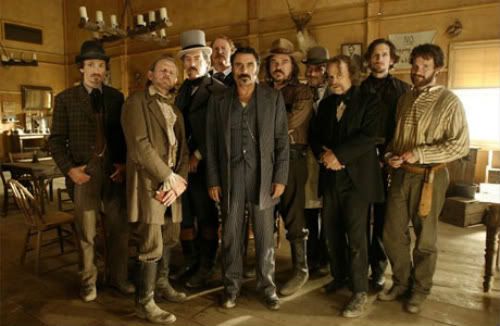--Reverend H.W. Smith, quoting the Bible, on the death of Wild Bill Hickok
I've been in bed sick this week, and have been watching a lot of the HBO show Deadwood, and I have been reminded of one of advantages that good television has over movies…the ability to tell a very long story, and to develop characters with real depth.
I am speaking here of GOOD television, which I would define as having a purpose other than mere entertainment. Probably the best modern example of this is the show The Wire. But Deadwood is up there.
So what is Deadwood about? I think it is about the formation of an American community, and all the forces that are at play to create a sustainable community. The main driving force is, of course, capitalism. The two saloon owners are the kingpins of the town. They, basically, call the shots.
But a community is more than its kingpins. And the show develops how each character comes to find his or her role in this frontier community, which serves pretty well as a microcosm of America. It's messy, unfair, brutal, vulgar, hypocritical. But somehow it works. The show is not saying, "This is how things should or shouldn't work." It's saying, "This is how things have worked here, in America." It is based on real people and real events in a real place.
As someone who has spent the past several months reading about the development of a community in California (Fullerton), I can see clear parallels of development. Of course, things were not as overtly brutal and lawless here, but the same patterns emerge. In Fullerton, the kingpins were the growers, specifically Charles C. Chapman. He owned the groves, he became the first mayor, he called the shots.
But I digress. Aside from the saloon owners in Deadwood (who are also, of course, pimps and property owners), who are the other important players, and what roles do they play?
On the opposite end of the spectrum of the saloon owners are the doctor and the reverend. They care for the sick and dying. They are the compassionate contrast to the saloon owners. While the doctor does make a good living, the reverend, being sincere in his work, does not. His sermons at the frequent funerals provide a kind of commentary on the life of the community…he is the voice of conscience.
Somewhere in between the capitalist kingpins and the compassionate caretakers is the lawman, as represented by Seth Bullock. He is neither greedy nor compassionate, but has a passion for justice. He plays his role well, sometimes clashing with the kingpins, but giving some order.
And then what you have left are those in the middle, employees of either saloon owner, the prostitutes, miners, small business owners. The newspaper man pretty much becomes the employee of the saloon owners.
And there you have it. A functioning society. A wealthy elite. A compassionate few. The lawman. And lots and lots in the middle, clawing for their share. A microcosm of America.
When Deadwood gets annexed by the US government, a new agency gets involved, the US congress. But, like everything else, congress can be bought. There is a classic scene between a wealthy saloon owner, Al Swearengen, and a lawyer representing the US legislature. The lawyer speaks in complex legalese. Al, who is corrupt but frank, cuts through the bullshit:
Al: I wanna know how the camp stands with the legislature. And don't give me this, 'On the one hand, and on the other hand.'
Lawyer: Alright.
Al: Just say, "This is the way I think it's gonna be,' cus this several hands fucking shit don't help me.
Lawyer: Alright. I'll boil it down. Lets assume, for the sake of conversation, that there's a new treaty with the Sioux people.
Al: People? That's what we're calling those cocksuckers now? That's the way things are going now?
Lawyer: Assuming the new treaty, the [Black] Hills will be annexed. The Territory respects the statutes of the Northwest Ordinance which states that a citizen will have title to any land, unclaimed or unincorporated, by simple usage. Essentially, if you're on it, and you improve it, you own it. But, what complicates the situation is the Hills were deeded to the Sioux by the 1868 Fort Laramie Treaty. This could mean that the land occupied by the [Deadwood] camp doesn't fall under any statutory definition of 'unclaimed or unincorporated.'
Al: So who needs to get paid?
Lawyer: Signs of conciliation and willingness would weigh in the camp's favor. But just as important is the presence of an ad hoc municipal organization that would enable the legislature to say, "Deadwood Exists." We don't have to create it. It would be disruptive if we did. The community is already organized, not legally maybe, but informally. Why not let's give this informal organization the blessing of legal standing.
Al: What's the right fucking number for the legislature?
Lawyer: There's a lot of gold out here, Al. To define "right" in this environment is liable to be an ongoing process. What I'm prepared to do is make a list of names [of congressmen] and a preliminary guess at some numbers.

